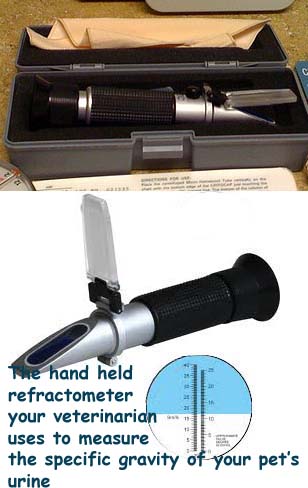Ron Hines DVM PhD
The Specific Gravity Of Your Pet’s Urine = SpGr, USG
Determining the specific gravity of your dog or cat’s urine is the way veterinarians determine how concentrated it is. That is an indication of kidney function. The higher the SpGr number, the more concentrated your dog or cat’s urine is. The lower the number, the more dilute it is. Pure water has a specific gravity of 1.0. If your pet’s kidneys are healthy, its urine specific gravity will be constantly changing – but its kidneys will do their best to keep the SpGr of urine between 1.015 and 1.060. That number will go up when your pet is dehydrated and go down after it drinks water. It will tend to be the highest just after it gets up in the morning.
A normal or high urine specific gravity usually indicates that your pet’s kidneys are working well. But it can also be high if your pet has developed diabetes. Diabetes allows sugar to leak into the urine. Specific gravity will also be high when urine contains substantial amounts of protein. Read about that here.
When your pet’s urine specimens repeatedly have high specific gravity, it is often a sign that your cat or dog is not consuming enough fluids during the day. That can be a major side effect of maintaining pets (particularly cats) on dry kibble. Cats rarely drink sufficient water to compensate for that, even when you keep bowels of water freely available to them. That problem is less common in dogs. Dehydrated pets are at greater risk of developing kidney and bladder stones because the mineral salts that form these stones fall out of solution (precipitate) to form crystals (often oxalate or struvite) much faster in concentrated (high specific gravity) urine than in dilute urine.
In the wild, cats consume rodents that are about 75% water. So, their need to drink additional water is minimal. The outward signs of chronic dehydration in cats are few. In humans, signs of dehydration are also often nebulous (vague). Dehydration is also common in all diseases in which apathy, weakness or reduced mobility occur. Other causes of dehydration that will elevate your pet’s urine specific gravity are vomiting, diarrhea, heatstroke and fever.
Persistently low urine specific gravity in your dog or cat is more common, and potentially more worrisome, than high specific gravity. In older pets, it is often the first sign (along with increased water consumption = polydipsia) that the pet’s kidneys are failing. Persistently low urine specific gravity is called isosthenuric urine (1.008-1.012). That urine is more or less the same concentration (osmolality) as the pet’s blood plasma. It means that your pet’s kidneys can neither concentrate nor dilute urine once it has initially formed. Due to the accumulation of toxic wastes in their blood stream, those pets are usually azotemic /uremic (= high BUN and creatinine) as well.
One study concluded that healthy cats should have a urine specific gravity of 1.035 or greater. That expected number decreased slightly as the cat’s aged, and it was slightly lower in female cats. Urine submitted to outside laboratories often registered slightly higher values than those run with a refractometer at your veterinarian’s clinic. In older (≥ 9yrs) cats, lower-than-normal urine specific gravity results should be followed by a blood BUN and creatinine assay to screen the cats for possible kidney disease. (read here)
Unspayed adult female dogs and cats with uterine infections (pyometra) often exhibit increased thirst and abnormally dilute (low SpGr) urine. That is due to toxins released by bacteria that have infected their womb.
A number of conditions can cause your pet’s blood calcium levels to be too high. You can read about them here. A higher-than-normal blood calcium level can interfere with the ability of your pet’s kidneys to concentrate urine (low SpGr).
Dogs and cats with failing livers (hepatic insufficiency) sometimes also produce low specific gravity urine. Those pets will probably also have abnormal levels of blood albumin, bile acids, cholesterol and liver tests (=ALT, AST, AP, bilirubin). Veterinarians are uncertain as to why liver problems affect the SpGr of dog and cat urine.
Overactive Adrenal glands (Cushing’s disease/hyperadrenocorticism) or excessive corticosteroid medication can also cause low specific gravity urine in dogs. Those problems are rare in cats. In dogs, it occurs because corticosteroids act on the brain to increase thirst. (read here) That effect is less pronounced in in cats. Urine becomes more dilute when these pets drink more.
Hyperthyroid cats also often drink more and produce more dilute urine. It is not clear why that occurs.
Low blood potassium can also be associated with dilute urine.
Under active adrenal glands (Addison’s disease /hypoadrenocorticism) can also cause your pet’s urine to be too dilute. An ACTH test is in order when your pet’s urine is too dilute (low specific gravity) but your pet’s blood creatinine test is normal.
Diabetes insipidus, a rare form of diabetes, will also cause pets to produce a urine with low specific gravity. This disease is usually due to a failure of your pet’s pituitary gland to produce the hormone ADH.
Complementary Tests That Come To Mind:
CBC/ WBC and a blood chemistry panel, ACTH stimulation test, Dexamethasone suppression test, urine cortisol:creatinine ratio
Do you have an older thin cat with low specific gravity urine? Besides a urinalysis and blood chemistry panel, a FreeT4 test for hyperthyroidism is in order
DxMe
